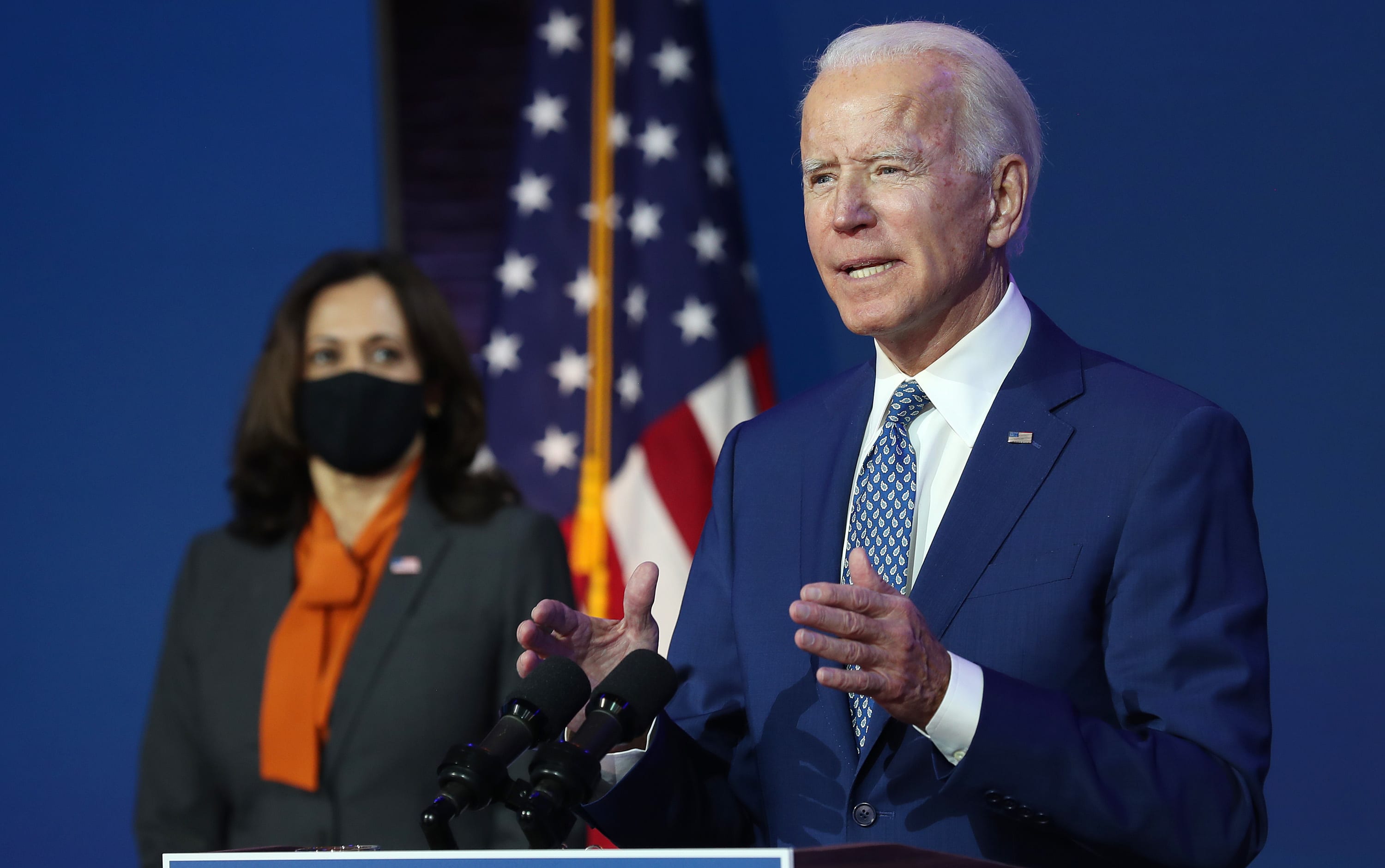President-elect Joe Biden and Vice President-elect Kamala Harris at transition Covid-19 advisory board briefing on Nov. 9, 2020 in Wilmington, Delaware.
Photo by Joe Raedle | Getty Images
Student loan forgiveness is looking more like a possibility under President-elect Joe Biden, but an unintended consequence may emerge unless Washington intervenes: a tax on loan forgiveness.
Biden has proposed creating a new program that would offer borrowers $10,000 of student debt relief for every year of national or community service, up to five years.
Sens. Chuck Schumer, D-N.Y., and Elizabeth Warren, D-Mass., have also said that the next president could wipe as much as $50,000 from borrowers’ balances via an executive order.
The catch is that under ordinary circumstances, debt forgiveness or discharge — whether you’re negotiating a balance on a credit card bill or offloading your home and underwater mortgage in a “short sale” — you’ll be owing taxes on the amount forgiven.
More from Smart Tax Planning:
Starting a side business? Master these tax tips first
Got Bitcoin? What it means for taxes in 2020
Business owners expecting PPP forgiveness can’t deduct costs
To make things worse: Though cash-strapped borrowers are enjoying a temporary reprieve from student loan payments, those who’ve had a hard time making payments would wind up owing the IRS on the forgiven balance.
“This is the thing about cancellation of indebtedness income: It’s not money in your bank account,” said John R. Brooks, professor of law at Georgetown University Law Center.
“You’re better off because you don’t have the liability, but you haven’t generated the cash to pay the tax,” he said.
But it doesn’t have to be that way.
Indeed, a resolution issued by Schumer and Warren this fall encourages the president to use the executive’s authority under the tax code to “ensure no tax liability for federal student loan borrowers resulting from administrative debt cancellation.”
“Right now, the IRS does consider forgiveness to be taxable,” said Brooks. “At a minimum, there is enough legal authority out there that they could have the authority to rule that it would not be taxable.”
Today’s patchwork of narrow solutions
Currently, there is a handful of provisions that allow for tax-free debt forgiveness — albeit in a very narrow set of circumstances.
First, there’s the Public Service Loan Forgiveness program, wherein a borrower’s remaining federal loan balance will be wiped after 120 qualifying monthly payments. Students must be working for the right kind of employer: a government organization or a 501(c)(3) not-for-profit.
The program is far from perfect. Nearly 180,000 unique borrowers have applied to have their debts wiped, and 3,469 have been forgiven, according to September data from the U.S. Department of Education.
Debt forgiveness under the public service program is tax-free.
There’s also the “insolvency exception” that’s already written into the tax code.
“The insolvency exception from cancellation of debt income likely applies to many taxpayers with heavy outstanding loans from college and graduate school,” said Joshua Blank, professor of law at the University of California, Irvine School of Law.
He gave the example of a taxpayer with $200,000 in student loan debt, plus $50,000 of other debt and $10,000 in cash in a bank account — her only asset. Under the “insolvency exception,” this person would be insolvent by $240,000.
In this case, the person’s student debt could be cancelled and excluded from her income. However, there’s a trade-off: The insolvent taxpayer loses some “tax attributes” or certain tax benefits, which include her basis in property and net operating losses.
Student debt that’s discharged due to death or total and permanent disability of the student is also tax-free.
Finally, this January, the IRS and Treasury Department gave tax relief to defrauded students who had their balances wiped when their colleges closed.
A tax fix in Washington
ljubaphoto | E+ | Getty Images
For now, it remains to be seen how Congress or the administration will help student loan borrowers contend with the taxes that would emerge from debt forgiveness.
A possibility could be for the forgiveness to come down in the form of a Covid-19 stimulus program, said Brooks. Perhaps it could be deemed a “qualified disaster relief payment” that’s excluded from gross income, he said.
Congress could also draft legislation that ensures only borrowers below a certain adjusted gross income receive tax-free forgiveness, said Leandra Lederman, director of the tax program at the Indiana University Maurer School of Law.
“You could do that here,” she said. “Exclude from income up to $50,000 of cancellation of indebtedness if the adjusted gross income is under a certain level and then phase it out.”
How Washington develops a solution for the taxes could come down to how they roll out the relief in the first place.
“There have been arguments back and forth that if this were done by executive order rather than through legislation, it’s hard to see how that would not be subject to tax liability,” said Kim Rueben, director of the State and Local Finance Initiative at the Urban-Brookings Tax Policy Center.
“If it’s subject to tax liability, then it’s really bad policy right now,” she said. “The people who are going to do well are the ones who can afford the tax debt, but those who are struggling?”
“You’re replacing student loan debt with owing the IRS, and it doesn’t feel like a good exchange,” Rueben said.
